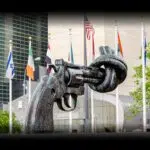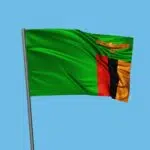Disarmament Week is celebrated from October 24 to 30 each year and brings to the forefront an important agenda of the United Nation to bring about world peace. At its core, the principle of disarmament suggests getting rid of all weapons and arms which contribute to warfare and mass destruction. The idea is for the international community to get rid of all arms, which are unnecessary for policing their own countries, in the interest of global security and becoming a reality. Imagine a world where countries don’t spend millions stockpiling their armories and instead utilize those funds and resources towards their own economic development and progress. In the words of the immortal John Lennon, “Imagine all the people, livin’ life in peace.” You may say we’re all dreamers, but with Disarmament Week, perhaps we’re that much closer to the goal.
History of Disarmament Week
Disarmament Week begins on the same day as the day the United Nations (U.N.) was founded — October 24, 1945. However, Disarmament Week itself was first established later on in 1978, following a special session on disarmament that was held by the United Nations General Assembly. They produced a “Final Document” in which Disarmament Week was officiated, and later on, in 1995, the General Assembly invited a whole gamut of governments, N.G.O.s, and other international authorities to actively take part in Disarmament Week. Their participation aimed to show their support and spread awareness about the various global-level issues around disarmament and international security.In 1952, the U.N. Security Council made inroads into this disarmament agenda by setting up the United Nations Disarmament Commission (U.N.D.C.), which was charged with the task of preparing proposal documents to instate a treaty for regulating and reducing the number of armed forces and weapons possessed by nations around the world. It also is aimed at urging countries to get rid of all their weapons of mass destruction, such as nuclear, chemical, and biological weapons. Despite some progress, there remains an estimate of around 30,000 to 50,000 nuclear warheads around the world.The history of disarmament itself as a global agenda can be traced back to the end of World War I, with the formation of the League of Nations (a precursor to the U.N.) on January 10, 1920. After the ‘Treaty of Versailles’ was ratified and signed in June 1919, bringing some peace to Europe, the Paris Peace Conference met again that year and established the League of Nations. The purpose of this was to improve international relations and prevent anything like the Great War from happening again, through a mutual acknowledgment of nations to choose peace. Both World Wars were preceded by powerful nations like England and Germany (and later Russia and the U.S.) racing against each other to build up their arms, and what resulted was wars and tragedy on a scale never seen before. It makes sense, then, that the tools for these atrocities be eliminated at the very least.
Disarmament Week timeline
The world’s first inter-governmental agency is formed as a way of maintaining global peace.
The U.N. is established in 1945, in San Francisco, California.
The Soviet Union (now Russia) shocks the world by testing out its first atomic bomb, sparking an arms race with the U.S.
The U.N. Security Council sets up the U.N.D.C., with documents purporting to reduce armed forces and weapons.
The ‘Final Document’ of the U.N. General Assembly establishes Disarmament Week, to be observed annually on October 24.
In Geneva, women lead Disarmament Week for the first time in the U.N.
Disarmament Week FAQs
Why is disarmament a need of the present-day world?
Crucial to the agenda of world peace and national security, disarmament is beneficial in several ways. Firstly, it builds relations of mutual trust between countries. Secondly, the money and resources spent on building up armaments can instead be used for other, more worthwhile endeavors and the economic development of countries. Thirdly, it is also the more moral standpoint to choose, as it promotes non-violence and an end to war.
How can disarmament be achieved?
For disarmament to become a reality, there needs to be established bonds of trust between nations all over the world. Once countries agree to basic tenets such as mutual cooperation, equality, and economic benefits, a sense of security can be built with these as the foundation. International security is a big concern, and if it can be tackled, and mutual faith fostered around the globe, then arms would take a backseat and security fears alleviated.
What is the purpose of disarmament?
Disarmament can be defined as “the act of reducing, limiting, or abolishing weapons.” A country’s armament is generally its military store of weapons and military strength. The purpose of disarmament is to get rid of all weapons and arms, especially those which can cause mass destruction, such as nuclear weapons and chemical/biological ones.
How to Observe Disarmament Week
-
Brush up on current affairs
There are numerous sources, like documentaries, journal articles, and other media forms, which can equip you to be more aware of what is going on in the world around you. This week is a great opportunity to dig deep and go beyond just skimming the newspaper, in order to understand the issues at hand.
-
Spread awareness
It does not require only governments and big organizations like the U.N. to spread awareness about disarmament and the important issues surrounding it. Everyone can be a part of the movement — all it takes is a little interest and some conviction in the idea of creating safety and trust among communities. Take to social media, or partner up with your local school or community center, and make it as creative as you can.
-
Organize or participate in your own MUN
Many schools have a Model United Nations (MUN) programme, which simulates the way a debate at the U.N. General Assembly might take place. Setting up a similar structure or association may be a great way to get more people involved, and it could be inclusive of people from a range of ages and communities.
5 Surprising Facts About Weapons Of Mass Destruction
-
There are nuclear black markets
Yes, these exist and can be bought and sold under the radar.
-
No nuclear weapons for Scotland
Scotland is ready to become a nuclear-weapon-free zone.
-
Gaddafi had a secret stash
Colonel Gaddafi, the leader of Libya, surrendered a secret stockpile of weapons of mass destruction in 2003.
-
Iraq spent a bomb on nuclear arms
During the rule of Saddam Hussain, in the 1980s, Iraq spent close to $10 billion to build up nuclear weapons.
-
U.S. nuclear weapons scattered across Europe
The U.S. has deployed nuclear weapons all over Europe, which are purportedly for the use of NATO allies.
Why Disarmament Week is Important
-
A cause for all
Disarmament Week brings to light a cause that we may rarely think about as being relevant to our own lives. However, an interest in national security is very much a factor that affects the lives of all citizens of any nation, and it is time we pay attention to the causes which can shape the future of the world at large. It is something that is relevant and real.
-
It unites people globally
Since the mission is to convince armed countries of the need to disarm and limit their forces, there is power in numbers. The more nations that get involved in this endeavor and agree to maintain their end as well, the more progress can be made on a worldwide scale. Hence, it is a mission that requires unity and cooperation, and above all — trust.
-
Promotes peace
World peace is talked about a lot, and for many people, it sounds like an unachievable ideal. With the right steps, however small they may be, there is hope that something akin to the idea may still come about. After all, we are all human first, before we are citizens and members of communities.
Disarmament Week dates
| Year | Date | Day |
|---|---|---|
| 2022 | October 24 | Monday |
| 2023 | October 24 | Tuesday |
| 2024 | October 24 | Thursday |
| 2025 | October 24 | Friday |
| 2026 | October 24 | Saturday |






























